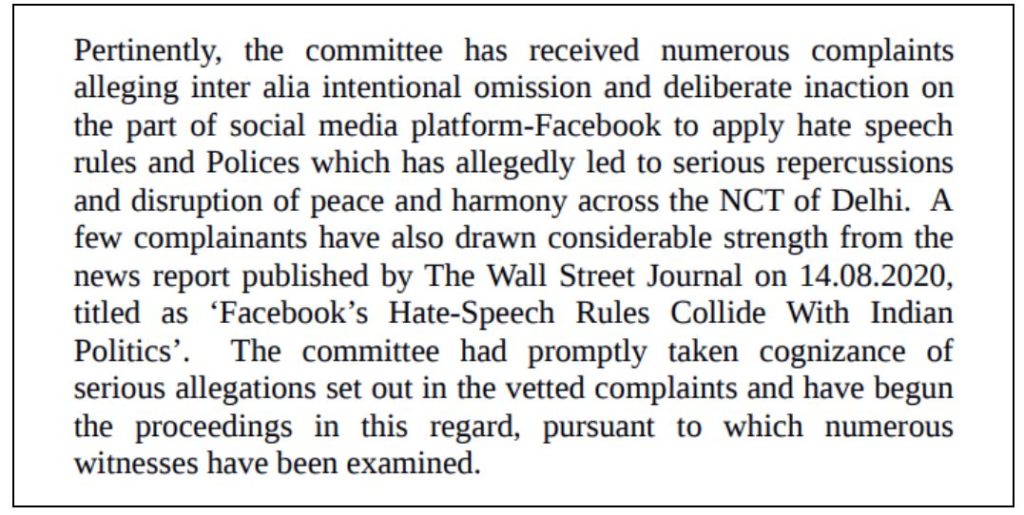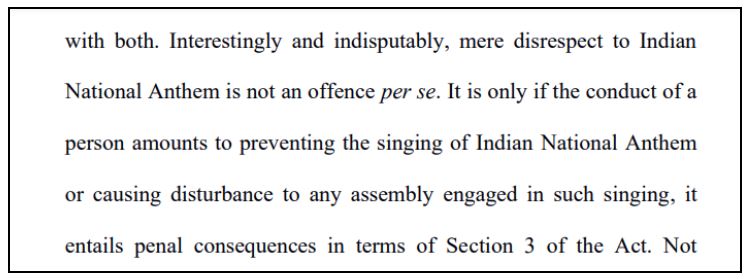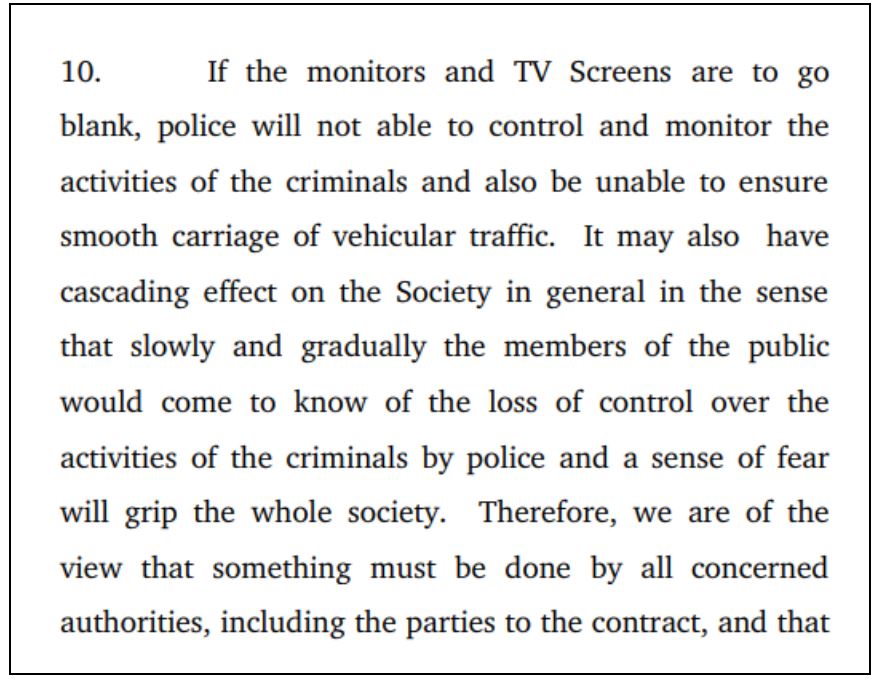In this roundup of court judgements, we look at Constitutional Courts’ remarks & directions on Facebook’s role in generating, controlling or modulating information, vaccinating mentally ill people in asylums, stopping police access to CCTV cameras and whether disrespecting to National Anthem amounts to an offence.
Supreme Court: Facebook cannot disrupt India’s ‘Unity in Diversity’ claiming ignorance or lack of pivotal role.
The Supreme Court refused to quash the summons issued by the Delhi Assembly asking Facebook India Head Ajit Mohan to appear before a panel probing Delhi riots. The Peace and Harmony Committee of Delhi Assembly was seeking his appearance in an inquiry to probe the role of fake social media posts in creating communal riots in northeast Delhi in February 2020.
Context: Delhi witnessed an unfortunate eruption of violence between 24 and 29 February 2020 with communal riots in different parts of North-East Delhi. In the wake of these riots, the Legislative Assembly of the National Capital Territory of Delhi (NCT Delhi) resolved to constitute a Committee on Peace and Harmony. The first public meeting was held on 05 March 2020 which was attended by religious leaders, social workers and various officials from different walks of life, where the Committee received complaints which among other things suggested that Facebook had been used as a platform for fomenting hate and jeopardising communal harmony.
In its judgment, the apex court made 3 important observations:
- Rejected the argument that Delhi Assembly has no legislative competence to enquire into the matter of Delhi riots.
- Facebook cannot take a simplistic approach that it is merely a platform posting third-party content and with no role in generating, controlling, or modulating information. Facebook’s role is not so innocuous and is more active while dealing with third-party information.
- However, the bench held that Delhi Assembly’s enquiry cannot encroach into prohibited domains of law and order and criminal prosecution, as they are subjects under the domain of the Union Government.
Facebook is the most popular social media platform in India with about 270 million registered users. The court opined that such vast powers must necessarily come with responsibility. While Facebook has played a crucial role in enabling free speech by providing a voice to the voiceless and a means to escape state censorship, one cannot lose sight of the fact that it has simultaneously become a platform for disruptive messages, voices, and ideologies. The information explosion in the digital age is capable of creating new challenges that are insidiously modulating the debate on issues where opinions can be vastly divided.

The court noted that while social media, on the one hand, is enhancing equal and open dialogue between citizens and policymakers; on the other hand, it has become a tool in the hands of various interest groups who have recognised its disruptive potential. Less informed individuals might have a tendency to not verify information sourced from friends, or to treat information received from populist leaders as the gospel truth.
The judgement elaborates that serious questions have been raised about whether there is a faulty architecture of such intermediary platforms and whether the kind of free, liberal debate which they sought to encourage has itself become a casualty, defeating the very objective of what the platform is providing.
The court said that it is too late in the day for companies like Facebook to deny that they use algorithms (which are sequences of instructions) with some human intervention to personalise content and news to target users. The algorithms select the content based on several factors including social connections, location, and past online activity of the user. These algorithms are often far from objective with biases capable of getting replicated and reinforced. The role played by Facebook is, thus, more active and not as innocuous as is often presented when dealing with third-party content.
Further, the court noted that internationally, Facebook has had to recognise its role in failing to prevent division and incitement of offline violence in the context of the stated ethnic cleansing in Myanmar where a crescendo of misinformation and posts, somehow missed by Facebook employees, helped fuel the violence. The platform similarly apologised for its lack of serious response to evident signs of abuse of the platform in Sri Lanka, which again is stated to have stoked widespread violence in 2018 in the country and had to acknowledge its need to be regulated though the exact method is still unclear and a prerogative of law-making authority. There have been endeavours in light of these events by countries like Australia, the US, the UK, and the EU for ways to regulate platforms such as Facebook in an efficient manner but their efforts are still at a nascent stage as studies are undertaken to understand the dynamism of the platform and its disruptive potential.
In summary, the apex court held that it is difficult to accept the simplistic approach adopted by Facebook – that it is merely a platform posting third-party content and with no role in generating, controlling, or modulating information.
Supreme Court: Vaccinate mentally ill people institutionalized in hospitals & asylums.
In the case Gaurav Kumar Bansal vs. Dinesh Kumar and Ors., the Supreme Court issued directions to the Union Government to ensure vaccination takes place for mentally ill patients who have been institutionalized in hospitals and mental asylums.
The court was hearing a matter pertaining to directions being sought to rehabilitate thousands of mentally ill patients who had been languishing in hospitals and asylums. The court was of the view that the progress in implementing the judgment and the Mental Healthcare Act 2017 has been tardy and it is time that the matter is taken up with utmost alacrity by the Union Government. Therefore, the apex court held that government has to ensure that all mentally ill patients are vaccinated for COVID-19.
Another aspect highlighted before the apex court was that the State of Maharashtra has decided to shift persons who are institutionalized in mental health establishments to beggar homes/custodial institutions. The court held that such an approach by the State Government would be contrary to the provisions of the ‘Mental Healthcare Act 2017’. The court categorically stated that any such action to shift such persons to ‘beggar homes’/custodial institutions would be counter-productive and contrary to the letter and spirit of the ‘Mental Healthcare Act 2017’ and directed the State of Maharashtra to look into this aspect immediately and ensure that this practice is discontinued.
Jammu and Kashmir HC: Not standing up for the national anthem or standing quiet may amount to disrespect & failure to adhere to fundamental duties but not an offence.
In the case of Dr. Tawseef Ahmad Bhat Vs. The state of J&K, the high court held that a mere disrespect to the National Anthem by not standing up or standing up but not singing is not an offence, although it may amount to a failure to adhere to fundamental duties.
The high court made these remarks while quashing an FIR filed against a college lecturer under Section 3 of Prevention of Insult to National Honour Act, 1971 for allegedly showing disrespect to the National Anthem in a college function conducted on 29 September 2018 for celebrating surgical strike conducted by the Indian Army.

The court elaborated that it is crystal clear that only intentional preventing of singing the Indian National Anthem or causing disturbance to any assembly engaged in such singing that is made punishable with imprisonment up to three years, or with fine, or both.
Not standing up while the Indian National Anthem is being sung or standing up but not singing the National Anthem along with members of the assembly engaged in such singing may amount to disrespect to the National Anthem and a failure to adhere to fundamental duties enumerated in Part IVA of the Constitution of India but is not an offence as defined under Section 3 of the Act.

It is the fundamental duty of every citizen, who claims fundamental and statutory rights from the State, to abide by the Constitution, respect its ideals and institutions, hold its National Flag and National Anthem in high esteem. However, the fundamental duties enumerated in Part IVA of the Constitution are also not enforceable in law nor the breach of such duties is an offence under any penal law of the State.
Bombay HC: Stopping police access to CCTV cameras interferes with public duty.
On its own motion, the high court held that the act of a maintenance agency, stopping Police access to CCTV cameras that are installed in public places for monitoring criminal activities, interferes in the performance of public duty and is prima facie questionable in law.
The judgement highlights that the court had earlier issued directions to the Nagpur Municipal Corporation for the installation of CCTV cameras on different occasions with a view to ensure public safety, streamline the vehicular and pedestrian traffic and create a sense of security amongst the citizenry. Following these directions, an ambitious project namely “Nagpur Smart and Sustainable City Development Corporation Limited” was undertaken and there are at present 3700 CCTV cameras and their functioning has to a great extent served the objects for which they have been installed in the city of Nagpur. However, recently certain issues have cropped up regarding the maintenance of these cameras.
Due to a dispute between parties relating to the non-payment of dues under the contract to Larsen & Toubro Limited (L&T), the company has taken steps to stop the access of these CCTV cameras by police and parties concerned. The Counsel for Larsen & Turbo Ltd informed the court that at present an amount of Rs. 135 crores are outstanding against the Government and the company has not stopped the functioning of the cameras. While the cameras are functioning and video recording is also being done, the only step that has been taken by L&T is the stoppage of access to the CCTV cameras by police and other concerned parties.
The Amicus Curiae expressed that the above steps by L&T are deleterious to the public interest. Although there are issues between the parties, they should not affect the public interest at large.
The court opined that although there is a communication gap between the employer and contractor in this case, if no access is provided to police, the very purpose of installation of CCTV cameras would be defeated and it may also go against the spirit of the directions issued by the Court regarding the installation of the cameras.

The Counsel for L&T informed the court that the access to the CCTV cameras to police and concerned parties would be immediately restored and made a request for rendering assistance to his company for getting back its outstanding amount.
Therefore, the court held that something must be done by all concerned authorities, including the parties to the contract. The court also clarified that it would not have expressed concern about such a communication gap, had it not been for the adverse impact on the public interest and public safety in the City of Nagpur. Considering the larger public interest, the high court urged the parties to the contract to resolve the issue amicably and requested the Government entities involved in the project to ensure that all the outstanding amounts are paid to Larsen and Toubro Limited at the earliest.
Featured Image: Important Court Judgements


